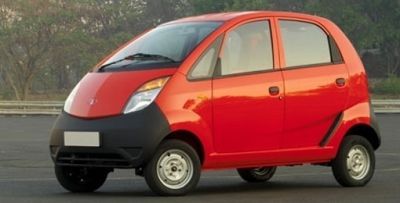Tata brings Nano minicar to Detroit

India's Tata brought its Nano minicar to Detroit Thursday to show the Motor City what the world's cheapest car looks like.
The Nano was unveiled for the first time in the United States at the Detroit science center, just a few miles away from where Tata's rivals were be displaying their latest wares at the Detroit auto show.
Executives said it will likely be years before the Nano hits US showrooms.
"No decision has been made yet on when to bring the car to the US," said Warren Harris, president and chief operating officer of automotive engineering consulting firm Tata Technologies.
However, a decision is expected soon on starting the specific re-engineering needed to get the Nano ready for the US market by the middle of the decade, he said.
The car needs "stiffer structure in the rear" to meet US crash test standards, Harris said.
It will also need a bigger engine as the top speed of the Nano sold in India only goes 65 miles per hour and the US version would need to get up to 80 or 90 miles per hour, Harris said.
"It also would need more features. It would also need things like iPod connectors, cup holders and USB ports," he said. "At least that was the reaction we got from the students we showed the car to."
Tata Technologies played an important role in the development of the Nano, which debuted last year and is one of the most talked about vehicles launched in the past decade because it costs only 2,500 dollars.
The Nano has sparked a race to create other ultra-low-cost cars for the Indian and other emerging markets.
French automaker Renault and its Japanese partner Nissan plan to launch a car to rival the Nano in 2012 that will be built in partnership with scooter and three-wheel specialist Bajaj Auto.
General Motors launched a new small car last week priced at about 7,000 dollars that will be released first in the Indian market and eventually sold in 150 countries.
str-mso/ao
Join our commenting forum
Join thought-provoking conversations, follow other Independent readers and see their replies
Comments
Bookmark popover
Removed from bookmarks